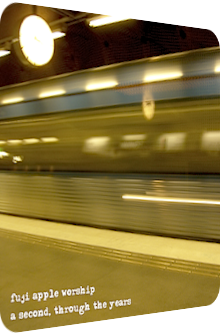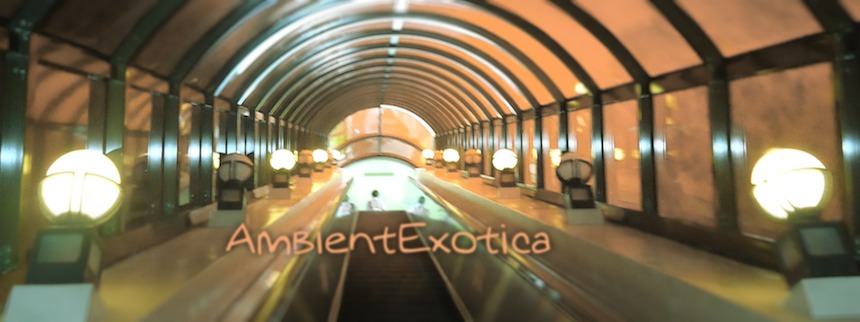
Fuji Apple Worship
A Second,
Through The Years
2013
Fuji Apple Worship is a quartet of musicians spread across Europe whose music is hard to categorize in a definite way. It is a sad state of affairs that genre conventions are still postulated and intact in this decade, but that is the base I have to work with, so I best describe the band's latest six-track mini album A Second, Through The Years as a hybrid of guitar drones and distant, intricated Pop particles. Mastered by 12k's Taylor Deupree, released in January on Thingstoburn Records, available to purchase (name your price) and listen to in full at Bandcamp, A Second, Through The Years features the talent of Giovanni and Nicola on the guitar, drummer Simone together with his laptop as well as Solar_Plex's additional guitar and analogue synths. Giovanni is also part of the Belgian duo Tropic Of Coldness whose Commuting EP I reviewed, and it is the Brussels-based artist who contacted me via email to make me aware of this particular work. The backgrounds of the respecitive musicians already hint to an overt use of the guitar, but this is neither a strict Drone record, nor an artifact where the guitars are incessantly processed or altered. Their characteristic traits and textures are always perceptible for a reason: no post-processing takes place, no filters are applied, all six tracks have been recorded in one go as a single set, and only an unspecified amount of minor editing and overdubbing has been realized. Giovanni's vocals, for example, were not featured in the original recording session and thus added post hoc. The various tracks or sections are described by the band as movements, which is an explanation for the changing atmospheres, the capricious wideness and gentle mood shifts. The specific reason for the album title has not been given away, but I think I can offer fitting assertions over the course of this review.
The mini album launches with a decidedly melancholic or even resigning artifact which is, however, only true if you read the title in a pessimistic way, for the actual aura of the sound is filled with anything but contentment. The nine and a half minutes long Afternoons Are Still Quite The Same opens with a sun-soaked, sine tone-accentuated synth aorta which is further accompanied by frizzling sprinklers, aqueous clicks and a sitar-resembling guitar strumming in the background. This dronescape slowly decreases in luminosity, making room for a rural bonfire-evoking guitar melody, with the applied amount of echoes implicitly harking back to the album title and its transfiguration of time compression. The aforementioned sprinkler-resembling frizzles become even more fitting in the track’s guitar-fueled apex, since they are now simulating crickets out in the field at a late summer's night. The afternoon setting is soon resurrected, although in a nostalgic way, for the glowing warmth of the guitars wanes, the structure of the song is traversed by holes of emptiness that are only halfheartedly covered by virtual ocean waves and crunchy Glitch flecks. The ensuing silence feels strangely lightweight yet grave; it depends yet again on the listener’s perception. Sure, a music-based construal always depends on the listener, but listening to an unmelodious nothingness results in an augmentation of the manifold converse perception layers. In that moment, Fuji Apple Worship are far away off the beaten electro-acoustic paths. Luckily, the guitar theme returns for one last time, bringing final rays of warmth to this particular arrangement.
Sibilant wind gusts lead to the next phase of the album, a dualistic vignette of less than three minutes called A Step Back. Oscillating whitewashed siren melodies and harmonica-like strings as well as liquedous downwards spiraling cascades expand the eeriness, whereas the unexpected inclusion of a counteracting campfire song with vocals by Giovanni tries to fight off the piercing interlopers, but to no avail. I guess the aesthetic concept of clashing harmonies in an adamantly maintained contemporaneity ought to unchain pressure and tension, but the result is a hodgepodge of imbalanced conflicts. Nothing sticks as everything succumbs to the klaxon drones. Only the last 40 seconds are delicately spine-tingling due to their hazy synths and crackling clicks, but these are already the backing ingredients of the following Single Girls Buy Double Beds, a crestfallen Krautrock artifact of doleful mourning. The lyrics are rooted in the Pop genre which the title gives away in glaring clarity, but the dissonant guitar chords, glacial cymbal phials, overdriven amplifier ground loops and nocturnal synth creeks make this a much more successful example in terms of the forceful corral of reluctant parts which A Step Back did fail to achieve. Heck, the title and the overarching setting may be perfectly earthen and rooted in a commonplace situation, but the reverberated Space-Age particles plus the deliberate cacophony evoke diffusely galactic proportions and open a loophole into the – now renowned – Psychedelic Rock experiments of the early 70’s that led to the pastel-colored, green-tinged primrose paths of guitar-owning slackers. Single Girls Buy Double Beds is a feast for Krautrock fans who can aptly distill and distinguish the respective layers. Ambient fans in general will be bewildered, even though this group of listeners is admittedly as large as it is individualized, so chances are that a few of them might relate.
Once They Were Enlightened is the shortest track of less than two minutes, and this time it is not the title but the sounds in the form of a subway station field recording which point to the album cover. The staccato-esque stream of the passing metro is enhanced by a foggy public announcement and infinitesimal guitar or synth strings which are perfectly camouflaged in the given surroundings. They seem to be the kind of artistic injection that insinuates a trace of significance and adds a synthetic amelioration of a perfectly familiar metropolitan setting. The following Blame It On The Correspondent, Not On The Writer kicks off with warmly wobbling AM frequency waves which lead to a no less snugly guitar loop of four notes, buzzing scents of electricity, underpinned acroamatic bass streams and additional, surprisingly coruscating guitar chords whose luminous emittance works well in adjacency to the bubbling fog layers and heavily pulsating waves. The tension increases nonetheless. The guitar layers swell, their warmth turns to a sizzling heat, the distantly Oriental timbre only enlarges this effect. A rather mild-mannered guitar placenta meanders to the conclusion of the album, The Comfort Of Numbers which starts with a muffled vocal section as heard through a loudhailer before the utmost dulcet guitar layers are meshed. Fuji Apple Worship create a mellifluous mélange for Sunday afternoon hammocks, but naturally there is an added twist in here, and this twist is expectedly seeping, for it consists of a crystalline sine tone which gyrates around the gold-colored guitar. In addition, there are acidic stokehold-like drones injected, interpolating both the mystique and uneasiness. A Second, Through The Years hence finishes on a fittingly indecisive and torn note. It is not a harmonious conclusion at all, since closing this mini album in a euphonious manner would have been the wrongest decision to make.
The signature element of A Second, Through The Years can be easily coined, although the term of that element is itself rather bland, ubiquitous and blurry: variety. Why the variety? In my search for a possible reason that would explain both my highly subjective feelings and the actual wealth of different vesicles and aural concoctions, I am once again gently pushed to the album title: A Second, Through The Years. With the awareness of conceivably overloading and über-poeticizing its meaning, it explains a lot of the seemingly – no, willfully – counterintuitive arrangements that boast, bustle and brim over of layers, loops, surfaces and patterns which are euphonious and shiny on their own, but incredibly demanding and alienating once they coalesce. It is the titular Second the quartet is able to fill with their creative clutter. Regardless of the state the mini album is currently in, whether guitars are playing, synths are whirring or brazen drones are buzzing, no layer exists on its own, there is an incessant stream of intertwining taking place all the time. Given the fact that this album is actually recorded live in one single session – The KLF's sample-fest Chill Out (1990) or Cinchel's recent Chicagoan Droneplay Isolation Experiments Vol 1 (2013) come to mind production-wise –, the granular intertwining is all the more impressive. In the end, A Second, Through The Years is an eclectic album, but for different reasons: it is not built on convoluted tone sequences, let alone jazzy interludes. Despite the slowly undulating nature of the drones and the scintillating sine waves, each of the six tracks feels labyrinthine because of the same pool of textures which mesh and depart in many different ways. Or how about "restless coziness"? That would be a second marker and variety's next of kin. Fuji Apple Worship's latest release is dedicated to listeners who want to bathe in guitar textures and are either well-trained or otherwise keen on the semi-circumvention of Pop with the subsequent advection of its bare structures (in the form of allotted vocals) into shape-shifting dioramas. Post-Krautrock fans ought to investigate as well. My favorite in the latter regard is the unexpectedly galactic Single Girls Buy Double Beds.
Further listening and reading:
- You can purchase (name your price) and listen to the album in full via this Bandcamp link.
- Follow Fuji Apple Worship on Twitter: @fujiappletv.
Ambient Review 184: Fuji Apple Worship – A Second, Through The Years (2013). Originally published on Feb. 20, 2013 at AmbientExotica.com.
